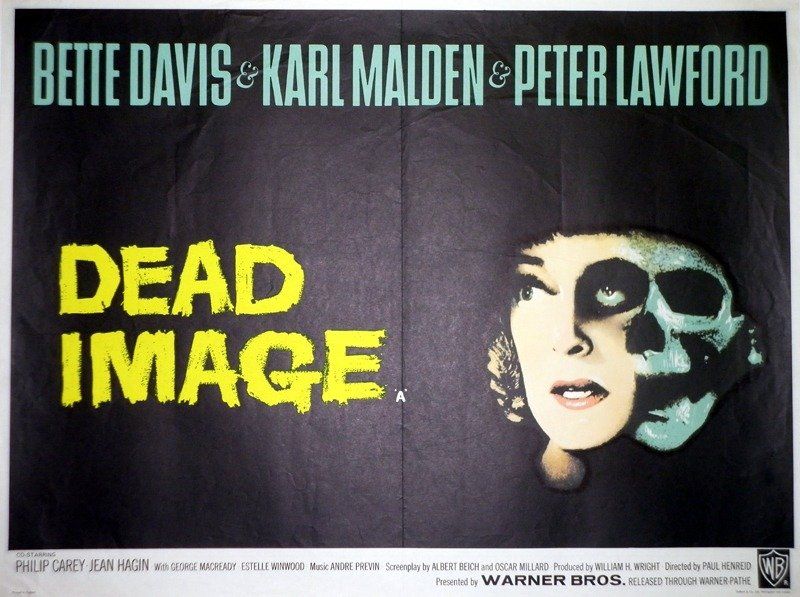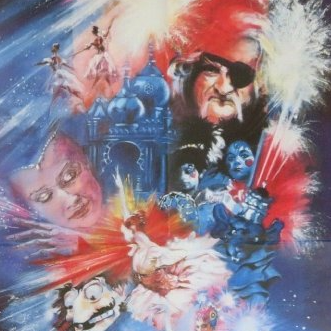Dead Ringer
Originally posted 20 February 2020
Bette Davis stars as both Jessica Tate and Mary Campbell in this melodramatic tale of… uh, revenge? Class conflict? Let's say class conflict.

UK poster | Warner Bros. / Warner-Pathé
1964 — USA
Presented by WARNER BROS.
Cast: BETTE DAVIS and BETTE DAVIS, with KARL MALDEN, PETER LAWFORD, PHILIP CAREY, JEAN HAGIN, GEORGE MACREADY & ESTELLE WINWOOD.
Director: PAUL HENREID
Producer: WILLIAM H. WRIGHT
Screenplay: ALBERT BEICH & OSCAR MILLARD
Original Story: RIAN JAMES
Editor: FOLMAR BLANGSTED
Cinematographer: ERNEST HALLER
Art Direction: PERRY FERGUSON
Costume Designer: DON FELD
Music: ANDRÉ PREVIN
In case you’re wondering, the U.S. poster does actually credit Bette Davis twice. Though I put the U.K. poster up there for whatever reason. I’m not really sure what the title change for the original British release was supposed to achieve, but any re-releases seem to be under the original title.
Following the success of Whatever Happened to Baby Jane? (1962), Bette Davis’ career had a bit of a resurgence (as did Joan Crawford’s, but that’s not for now). Only really a bit, mind you; after the honeymoon period where she did a few major US studio films, the majority of her later films tended to be either European productions or made by comparatively small outfits such as AIP or Disney (bear in mind, Disney’s ascension to power-player wherein if feels like they essentially own the entire film industry didn’t really begin until the mid-‘80s; this was the period when they did animation and kids’ films and everyone’s monocles popped off in horror when they made something that got a PG rating). During this honeymoon period came Dead Ringer, a thriller wherein the inimitable-if-you-ignore-all-the-imitations Miss Davis plays identical twins. Again. Having already done so at some point in the ‘40s.
This time around Davis’ (estranged) sisters are a wealthy dowager (Margaret) and a down-on-her-luck bar owner (Edith). Back when, the former stole the latter’s man through the magic of faking a pregnancy, leaving Edith to their drunken father and also a ton of debts, so after reconnecting at the husband’s funeral, she does the obvious thing and kills the merry widow and switches places with her, as one does. Also, the murderous one is the heroine; that ‘merry widow’ crack weren’t simply a joke. The film’s main tension comes from the seeing how far Edith can go before someone notices that she isn’t who she claims to be, while at the same time she finds out that her sister was involved in some pretty dubious stuff of her own.
Really it strikes me that if the dead husband (Frank) was in a position where his lover’s sister could convince him that he knocked her up (it seems to be made clear that there wasn’t any deception regarding the two’s identities there), then he really wasn’t much of a prize to get upset over. Well, beyond the money, I guess, though Edith apparently wasn’t after that in their relationship. Still offing her sister not only gets the plot into high gear, but also conveniently saves money on effects due to no longer having to put two Bette Davises? Bettes Davis? (Actually, I suppose the Latinate thing would be ‘Daves’) on screen at the same time. It already does quite a bit of that in the first act; lots of shots composed in a manner to avoid showing both sisters’ faces directly and the widowed one manages to wear about the most opaque veil possible as part of her mourning garb. (Actually the opening scenes make it seem like it’s trying to keep the ‘Bette Davis plays twins’ angle secret, even though it was basically the film’s entire marketing campaign.)
Still though, despite the perhaps inherent preposterousness of the premise, as a thriller and as a melodrama the film holds together pretty well. It’s a great showcase for Davis who manages to make her two characters distinct in both overt and subtle ways, with each having their own tics and bearings beyond just what the script deigns to tell us. This is all wrapped up in some gorgeous cinematography which amplifies the gothic element of the story at hand. It’s hampered somewhat by its tendency to blink when something violent happens; while the Hays Code was still a thing when this was made, it still feels tamer than it need be. The whole affair certainly feels softer than Baby Jane, at any rate. I’ve seen funnier ‘person rolls around on floor pathetically pretending to be mauled by an obviously stuffed animal’ scenes, but this film’s one (oh, yes, that happens) is still pretty damn funny. In fact, as backhanded as it sounds, the film is a lot of fun, particularly when it ramps the melodrama up to eleven. For instance, in one part of the film, there’s a safe containing a jewellery box and only the dead sister knows the combination, and the imposter has just asked the maid to put away her finery. DRAMATIC STING! ZOOM IN ON THE SAFE!
The thing’s appeal isn’t purely camp, as the plot manages to veer into some comparatively unexpected and interesting directions; at least, as unexpected as it can for the era. The Hays Code naturally comes into play, so suffice to say justice has to prevail in the end. While by this time the MPAA loosened up restrictions a bit, I guess the crimes here are far too premeditated for any sort of ambiguity. There’s a scene that is very obviously intended to be the end of the film, but we have to carry on for another few minutes with a ‘justice prevails in case you didn’t get that from the previous scene’ epilogue; you can actually find quotes from Davis complaining that the original ending wasn’t deemed satisfactory by the higher ups, requiring something blander be put in. Still, I’ve seen worse endings of the type (check out a different Davis vehicle, The Letter (1940), whose attempts to tack on a moral ending without changing the original story outright prove unintentionally hilarious). Dead Ringer manages a nice tinge of bitterness in its dealing with the law in the end, in keeping with the vague sense of bitterness that permeates the story as a whole, and it’s this bitterness that keeps the film interesting. For all the melodrama, the film is acutely aware that the characters are ultimately sad people using the material to futilely try and fill the void of what they’re lacking.
Also, Estelle Winwood plays a character called Doña Anna, which she does with not-at-all-Latin flair. That’s got to be worth something.
At time of writing, Dead Ringer is available for rent on Amazon and Youtube, amongst other services. I recommend JustWatch for keeping up with where films are streaming (including this one!). Alternatively, physical copies are reportedly available for rent via Cinema Paradiso.
The film presently has a PG rating (last being submitted in 1988). This predates the BBFC having a snappy summary of why, but it seems about right; while there's thematic stuff, there's not much that seems like it'd be particularly upsetting. Originally, it had an 'A' rating, as you can see on the poster, which was pretty much the equivalent under the old system.



